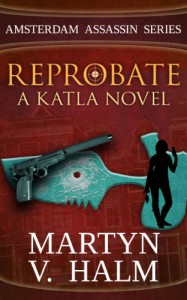A Game of Go

I suspect we all have occasional desires to break laws and not get caught, not even by our consciences. Katla, the protagonist of Reprobate, gets away with murder—without regret. Meet your Shadow.
Halm has created a complex, realistic, and compelling character. While she isn’t likeable, he crafts his story in such a way that I couldn’t help rooting for her in spite of her occupation as a freelance assassin. I didn’t find the musician Bram likeable either, but he was equally intriguing. He is a perfect match for Katla.
In writing about Bram, Halm is able to take the point of view of a blind man beautifully, portraying not only the sensory experience but the mind and heart of a man who has coped with his loss through inner strength. Bram’s affinity for Japanese culture—collecting tsuba, playing go, practicing shiatsu and martial arts—is elegantly blended into his character and the way he lives with his blindness. It also subtly permeates the whole book. Although the author is Dutch and the book is set primarily in the Netherlands, Reprobate echoes Japanese literature in its themes, its exploration of a hidden world, and in its contrasting scenes of violence and intimacy. Halm writes about law breakers and law enforcement with equal respect, about sex and autopsies with equal precision, about the execution of an assassination without judgment or attachment. I never felt a good guy/bad guy energy in the story, but an interplay of equal and opposite forces. All the major players are doing jobs, as they see their roles in the world. Many are shown in their private lives with their families, their pets, their friends, their solitude—law enforcement and law breakers alike—revealing layers of their characters through these domestic interactions, and even their choices of animal companions. Katla isn’t an inhuman killer. Though she isn’t the student of Japanese culture that Bram is, she seems to follow something like the samurai code of the philosopher-scholar-warrior who is at peace with death, and studies the arts of strategy and violence.
The book had few flaws, but here are the reasons it lost it fifth star and I call it a four-star book:
One: Occasional unnecessary details had a kind of peephole quality. The reader doesn’t need to know that one character attempted unsatisfactory masturbation in order to get to sleep, or precisely how another went about urinating while coping with a bullet wound in the leg. In my opinion, it would have been enough to say that the task was difficult.
Two: The overuse of names in conversation grated on me. Unless this is some Dutch idiosyncrasy, it’s not realistic (and even if it’s a Dutch thing, Halm has characters of all nationalities doing it). The following are two examples that sounded strange to me. Simon arrives at his health club. The attendant speaks to him. “You’re early, Simon.” “I’ll be at the pool, Ruud.” A similar thing occurs later in the airport with two Latin American characters. “What do you think, Jesus? DEA or FBI?” “I think they’re FBI, Rafi.” The book is peppered with this sort of thing.
Three: I was surprised by what two characters talk about in the back of a taxi near the end. Is the back seat soundproof to the front? I’ve never been in a Dutch taxi, but in the American taxis I’ve been in, there’s no barrier. I can’t believe they would let themselves be overheard.
All in all, though, this is polished, inventive work. I looked forward to each chapter even though I don’t normally read books with this much violence. The violent scenes, while graphic, are always relevant to the story. Halm is a master of characterization and plot, adept at integrating settings and research into a page-turning tale. I think many readers will get hooked on the series.
 2
2


